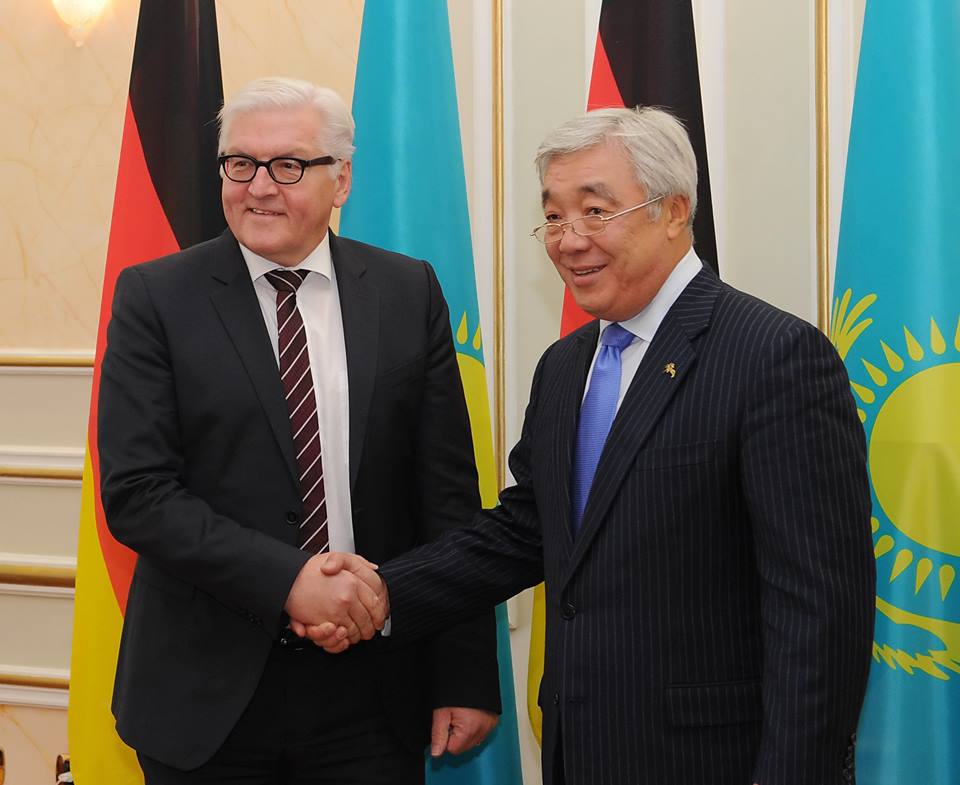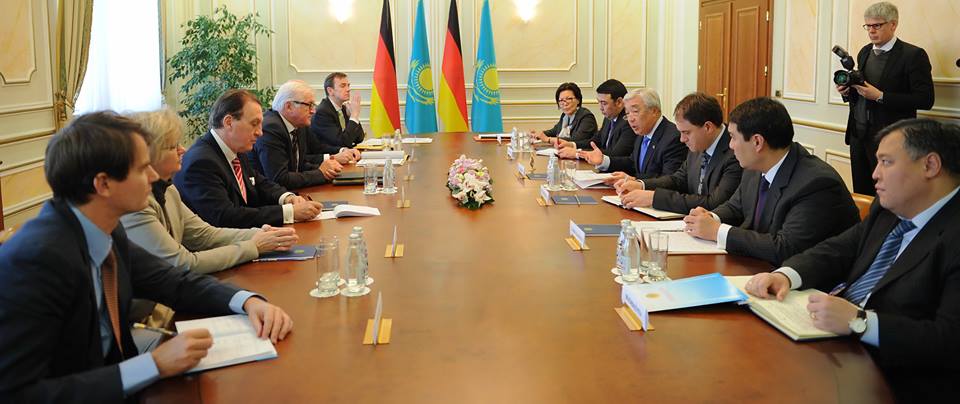ASTANA – Kazakh Foreign Minister Erlan Idrissov met Nov. 10 with visiting German Foreign Minister Frank-Walter Steinmeier at the Kazakh Ministry of Foreign Affairs in Astana.
 Idrissov and Steinmeier discussed economic cooperation between Kazakhstan and Germany, which included a 2013 bilateral trade total of $3.2 billion and a January-through-September 2014 total of $1.95 billion. Seventy-two trade and investment agreements between the countries totaling $3.2 billion have also been signed over the last three years.
Idrissov and Steinmeier discussed economic cooperation between Kazakhstan and Germany, which included a 2013 bilateral trade total of $3.2 billion and a January-through-September 2014 total of $1.95 billion. Seventy-two trade and investment agreements between the countries totaling $3.2 billion have also been signed over the last three years.
“Kazakhstan is the leading trade partner of Germany in Central Asia. Today, I am accompanied with a big delegation from the German business community. Our country is interested in investing in Kazakhstan,” Steinmeier stated at a joint press briefing with Idrissov after their meeting. In the beginning of the meeting, which took place with the media present, Steinmeier also called Kazakhstan the “anchor of stability” in Central Asia with whom Germany would like to strengthen ties.
“Germany sees great opportunities in taking part in highway, railroad and various other infrastructure projects [in Kazakhstan],” he added at the press briefing.
Idrissov reminded of the importance of two political documents that were signed in the wake of Kazakh President Nursultan Nazarbayev’s visit to Brussels in October: a document on the completion of negotiations on the draft of the Enhanced Partnership and Cooperation Agreement (PCA) between Kazakhstan and the European Union and a document completing bilateral negotiations between Kazakhstan and the EU regarding Kazakhstan’s accession to the World Trade Organisation (WTO).
 “We consider the PCA an opportunity to bring our cooperation to a new level in all areas of cooperation. The document provides a framework for the strategic partnership and a significant growth of trade and investment,” Idrissov said.
“We consider the PCA an opportunity to bring our cooperation to a new level in all areas of cooperation. The document provides a framework for the strategic partnership and a significant growth of trade and investment,” Idrissov said.
Also, the ministers exchanged views on international issues. At the press briefing, Steinmeier noted that during his conversations with President Nazarbayev earlier in the day and Foreign Minister Idrissov, conflict de-escalation was discussed. “We reviewed proposals that our countries, jointly as neighbours, can take towards the de-escalation of pressing issues in the Middle East, Iran, Iraq and Ukraine. Kazakhstan and Germany will continue to make efforts to ensure that the intensity of these conflicts are decreasing,” he said.
The ministers also discussed developing interparliamentary and interparty relations between Kazakhstan and Germany.
“Deputies of Kazakhstan’s Parliament hold meetings with members of the Germany – Central Asia parliamentary group in the Bundestag on a regular basis. The dialogue between the Nur Otan and Christian Democratic Union parties is also developing,” Idrissov said.
The parties expressed satisfaction with the institutional framework designed to expand trade and economic cooperation at the state level. The activities of the Kazakh-German Intergovernmental Working Group on Trade and Economic Cooperation and the Kazakh-German Business Council for Strategic Cooperation were also underlined.
Idrissov told his German counterpart that Kazakhstan attaches great political and practical importance to cooperation on issues concerning ethnic Germans living in Kazakhstan. He stated that they serve as a bridge between the two countries as do immigrants from Kazakhstan in Germany.
In addition, during the meeting, Idrissov briefed his colleague about preparing forEXPO2017 and handed an official invitation letter from President Nazarbayev to Federal Chancellor Angela Merkel to participate in the exhibition.
“The theme of EXPO 2017, Future Energy, is focused on transitioning to a green economy. Our country is ready to share its experience in this field with our Kazakhstan partners,” the German minister announced.
At the press conference,Steinmeier said that the issue of visa facilitation for Kazakhstan’s citizens will be reviewed by the German government, even though it is a long process, because Germany follows the rules applied by the European Union. This summer, Kazakhstan introduced a unilateral visa-free regime for citizens of the top 10 investor nations, including Germany.
Asked about the EU Strategy for Central Asia which he had led the process of crafting in 2007 during his first stint as German foreign minister, Steinmeier said the strategy has had its successes and updating it will be a subject for further discussions with the countries in the region.


